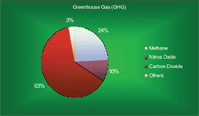Self-monitoring is one of those things the Environment Agency has picked at for a long time but it's still a surprise to see a full-blown scheme to expand it in the air.
The Agency has chosen to roll out its new Operator Monitoring Assessment (DMA) system on monitoring air emissions from industrial processes regulated under Integrated Pollution Control (IPC) - one of its toughest regulatory tasks.
"We chose it first as the most difficult to do,"says the Agency's OMA manager, Paul Wiggins. "It has the greatest variety and complexity and itmakes sense to start with it."
Under OMA, the Agency will assess the self monitoring of air emissions that operators and their contractors carry out and, on the basis of this audit,decide what priority to give check monitoring of the site. Plainly this provides operators with an incentive to do the job properly; do it well and the lightest of regulatory touches will be placed upon them, do badly and the onerous hand of the regulator will lie heavy.
The scheme was finalised last November and trials and audits are now well underway. A review
of progress so far is in progress and the Agency hopes to have all 1800 IPC processes in England and Wales audited by the Spring of 2003.

 Science, business, and government organizations are starting to support the fact that reducing greenhouse gas is an inevitable and integral component of doing business. Environmental awareness, particularly as related to excess greenhouse gases, has seen a surge of visibility from the international and domestic business communities.
Science, business, and government organizations are starting to support the fact that reducing greenhouse gas is an inevitable and integral component of doing business. Environmental awareness, particularly as related to excess greenhouse gases, has seen a surge of visibility from the international and domestic business communities.